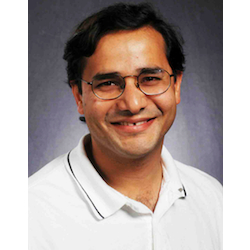
Cancer is a genetic disease that can lay waste to DNA. In many cases, error correction mechanisms mutate, removing the quality control circuits that maintain genes, setting the stage for more mutations.
But sometimes the changes are even more profound. Chunks of DNA are duplicated and break away from their home chromosomes, forming small, circular islands of extrachromosomal DNA (ecDNA). Under a microscope, chromosomes look like they’ve been hit by a sledgehammer.
UC San Diego Computer Science and Engineering (CSE) Professor Vineet Bafna is fascinated by ecDNA and is working with biologists to measure its impact. These structural changes, and the associated gene duplications, can amplify genes that drive rampant cell division, as well as genes that make tumors treatment resistant, giving them an outsized impact on cells.
“There’s been a lot of research that suggests high copies of oncogenes – genes that are proliferative in nature – lead to poor outcomes,” says Bafna. “But what is not clear is how these copy number variations arise. How is it a gene can make 20, 50, 100 copies?”
Bafna and colleagues are working to answer these questions and help determine how ecDNA drives cancer. They hope these insights will eventually lead to new anti-cancer therapies.
Taking an Algorithmic Approach
Since the human genome was sequenced, many researchers have focused almost exclusively on single letter changes in oncogenes and how these affect cellular function. While this has been a fruitful path, structural changes to chromosomes have been somewhat neglected. Working closely with UC San Diego pathology professor Paul Mischel and others, Bafna has been developing computational approaches to identify ecDNA and other chromosomal changes.
“The question I’m interested in is: How can we determine what is causing a complex structural rearrangement based on a genomic signature?” said Bafna.
The Bafna lab developed machine learning techniques to detect ecDNA in cellular images. These techniques can spot ecDNA when cultured cancer cells enter metaphase, the second stage of cell division, when chromosomes become quite compact.
From there, it’s just a matter of counting. Conducted jointly with the Mischel lab, these studies have analyzed thousands of images and found ecDNA in virtually every cancer subtype – hiding in plain sight.
Unfortunately, these imaging techniques are difficult to deploy with patient tumors, from which only DNA, isolated from chromosomes, can be extracted. To get around this, Bafna and colleagues examine short (150 to 300 base pair) ecDNA fragments in tumor samples and compare them to reference genomes. If the two ends of these ecDNA fragments match a reference chromosome, this strongly indicates the region detached from that chromosome.
Working with Mischel and Professor Roel Verhaak at the Jackson Laboratory in Maine, Bafna applied these genomic methods to more than 3,000 tumor samples and found ecDNA in over 20% of the tumors, with higher frequencies in glioblastomas, lung and kidney cancers.
Grand Challenges
These structural defects have become increasingly important for the scientific community. Interrogating ecDNA is one in a series of Cancer Grand Challenges, which offer $25 million awards to researchers who can answer important questions about cancer pathology.
“What are the biological mechanisms involved in ecDNA generation?” asked Bafna. “What's the role of ecDNA in the evolution of cancer? Can we model and predict ecDNA evolution? Can we target any vulnerabilities therapeutically? These are questions we’ve been trying to answer anyway, so this is a big deal for us.”
The researchers also believe it’s time to translate their discovery research into treatments. Two years ago, Bafna and Mischel co-founded Boundless Bio, a San Diego life sciences company working to find ecDNA-focused therapeutics.
“We are taking what we’ve learned about ecDNA vulnerabilities and identifying molecules that could potentially target those vulnerabilities,” says Bafna. “We believe this will give us another tool to fight cancer.”

